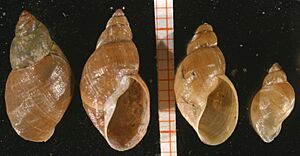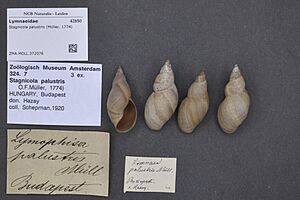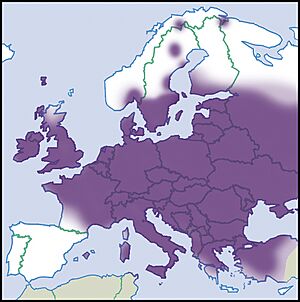Stagnicola palustris facts for kids
Quick facts for kids Stagnicola palustris |
|
|---|---|
 |
|
| Four shells of Stagnicola palustris | |
| Conservation status | |
| Scientific classification |
|
| Kingdom: | Animalia |
| Phylum: | Mollusca |
| Class: | Gastropoda |
| Subclass: | Heterobranchia |
| Clade: | Euthyneura |
| Superorder: | Hygrophila |
| Family: | Lymnaeidae |
| Genus: | Stagnicola |
| Species: |
S. palustris
|
| Binomial name | |
| Stagnicola palustris (O. F. Müller, 1774)
|
|
| Script error: The function "autoWithCaption" does not exist. | |
| Synonyms | |
|
|
Script error: No such module "Check for conflicting parameters".
The Stagnicola palustris is a type of air-breathing freshwater snail. It's an aquatic animal that belongs to a group called gastropod molluscs. These snails are part of the Lymnaeidae family, which are often called pond snails.
There are two main types, or subspecies, of Stagnicola palustris:
- † Stagnicola palustris antilibanensis (Blanckenhorn, 1897) - This one is extinct, meaning it no longer exists.
- Stagnicola palustris palustris (O. F. Müller, 1774) - This is the type we see today.
Contents
Understanding Stagnicola Snails
Sometimes, you might see another snail called Stagnicola turricula. Scientists used to think it was a different species. However, they found out that Stagnicola turricula is actually the same as Stagnicola palustris. This is because they are not genetically different. Even so, some people still list them separately.
What Does Stagnicola palustris Look Like?
The shell of an adult Stagnicola palustris snail is usually about 10 to 18 millimeters (about 0.4 to 0.7 inches) long. It is also about 6 to 10 millimeters (about 0.2 to 0.4 inches) wide. This makes them fairly small, easy to hold in your hand.
Where Do These Snails Live?
You can find Stagnicola palustris snails in many countries and islands across Europe. They like places with fresh water.
Some of the places where they live include:
- Croatia
- Czech Republic
- Germany
- Great Britain
- Netherlands
- Poland
- Slovakia
What Kind of Home Do They Prefer?
This snail likes to live in shallow freshwater areas. These places usually have plenty of oxygen in the water. They prefer calm waters like ponds, slow-moving streams, or ditches.
Similar Snails in North America
In North America, there are snails that look very similar to Stagnicola palustris. These snails are called Ladislavella elodes. Some scientists think that Ladislavella elodes might actually be the same species as Stagnicola palustris. They are still studying this to be sure.
 | William M. Jackson |
 | Juan E. Gilbert |
 | Neil deGrasse Tyson |




